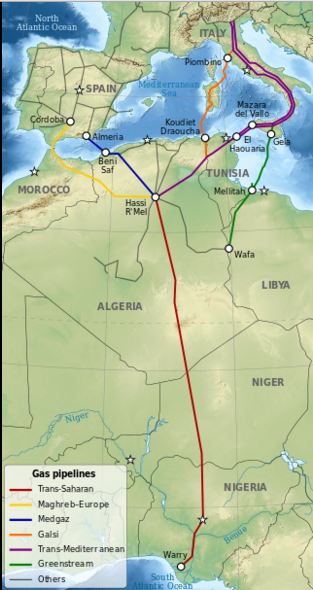The Tuareg are tough nomads who live in the Sahara Desert , in Algeria , Libya , Niger , Nigeria and Mali
Map 1 The Tuareg Region
The Tuareg were traditionally financed by Muammar Gaddafi, the socialist dictator of Libya Libya Mali
Map 2
“Azad”
For Gaddafi the Tuareg were very useful, first because they were causing turmoil in a region that Gaddafi was confronting the French. France traditionally had great influence over West Africa . With red on the following map you can see the French colonies in Africa , and with blue the British. Libya France traditionally had stronger economic ties with Algeria and Italy with Libya
Map 3 African Colonies in 1914
Muammar Gaddafi always claimed a part of the French influence in West and North Africa, and he trained terrorists that were against the French, or against governments friendly to France World Revolution Center at Benghazi
Map 4 Benghazi
I often say that the French rely on nuclear energy and they import 25% of their uranium from Niger , and Niger borders Libya France
65th Paragraph
Other than causing troubles for the French in Africa, the Tuareg were also useful to Gaddafi because they made difficult the construction of the Trans-Saharan Pipeline, which would connect Nigeria and Algeria through Niger , and which would hurt Libya Nigeria , Algeria agree to build Sahara gas link”, July 2009
1st and 2nd Paragraphs
The idea of piping gas thousands of kilometres across the Sahara was first dreamt up more than 30 years ago, but the project remained on the drawing board pending a concrete agreement between neighbouring states and a clear funding plan.
7th Paragraph
France's Total (TOTF.PA), Royal Dutch Shell (RDSa.L) and Russia 's Gazprom (GAZP.MM) have all expressed interest in helping Nigeria 's state-run NNPC and Algeria
Gazprom and NNPC agreed to invest at least $2.5 billion to explore and develop Africa 's biggest oil and gas sector, including building the first part of the Trans-Sahara pipeline. [ID:nLO549518]
Some analysts see Russia's keen interest in Nigeria as an attempt to maintain its grip on Europe 's natural gas supplies.
Map 5 Trans-Saharan Pipeline
The French Total, the Anglo-Dutch Shell and the Russian Gazprom offered to help Nigeria and Algeria Europe ”.
The Trans-Saharan also hurt the economic interests of the Arabs of the Gulf, the Iranians and the Turks, and as a result the Tuareg allied with the Jihadist organizations like Al-Qaeda. See “France urges talks with Mali
The above were definitely one of the reasons that the French grabbed the chance and attacked Gaddafi when the Arab Spring broke out. See “France
When the Arab Spring broke out, Gaddafi once more hired the Tuareg to defend him. But this time Gaddafi fell, and the Tuareg were left with the arms provided to them by Gaddafi. When they went back home they used their enhanced arsenal to claim independence in Mali
Map 6 The Tuareg Rebellion
Tuareg rebellion (2012)
For the Tuareg funding by Gaddafi see also the following two articles from the BBC and the New York times.
“Gaddafi's influence in Mali
2nd Paragraph
The trouble began when hundreds of Malian combatants who had fought to defend the late Libyan leader, Muammar Gaddafi, fled back home with weapons at the end of last year and formed the most powerful Tuareg-led rebel group the region has known - the Azawad National Liberation Movement (MNLA).
“Qaddafi’s Weapons, Taken by Old Allies, Reinvigorate an Insurgent Army in Mali
2nd and 3rd Paragraph
Hundreds of Tuareg rebels, heavily armed courtesy of Colonel Qaddafi’s extensive arsenal, have stormed towns in Mali’s northern desert in recent weeks, in one of the most significant regional shock waves to emanate directly from the colonel’s fall.
After fighting for Colonel Qaddafi as he struggled to stay in power, the Tuaregs helped themselves to a considerable quantity of sophisticated weaponry before returning to Mali
19th and 20th Paragraph
In some ways, the aggressive new Tuareg campaign represents the kind of support the rebels had long sought from Colonel Qaddafi, who for years alternately aided and betrayed the desert warriors, according to a recent study by Mr. Boilley. After the great regional droughts of the 1970s and 1980s, young Tuaregs migrated north to the colonel’s military training camps, to later fight for him in places like Chad , while at the same time destabilizing the governments in Niger and Mali






Δεν υπάρχουν σχόλια:
Δημοσίευση σχολίου